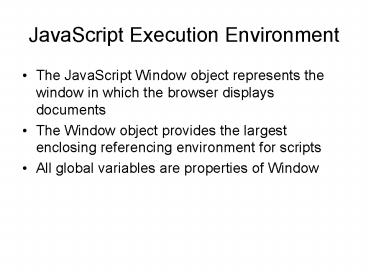JavaScript Execution Environment - PowerPoint PPT Presentation
1 / 18
Title:
JavaScript Execution Environment
Description:
The Window object provides the largest enclosing referencing environment for scripts ... Given a document with just one form and one widget): form action ... – PowerPoint PPT presentation
Number of Views:155
Avg rating:3.0/5.0
Title: JavaScript Execution Environment
1
JavaScript Execution Environment
- The JavaScript Window object represents the
window in which the browser displays documents - The Window object provides the largest enclosing
referencing environment for scripts - All global variables are properties of Window
2
Execution Environment (2)
- Implicitly defined Window properties
- document - a reference to the Document object
that the window displays - frames - an array of references to the frames of
the document - Every Document object has
- forms - an array of references to the forms of
the document - Each Form object has an elements array, which has
references to the forms elements - Document also has anchors, links, images
3
The Document Object Model
- DOM 0 is supported by all JavaScript-enabled
browsers (no written specification) - DOM 1 was released in 1998
- DOM 2 is the latest approved standard
- Nearly completely supported by NS7
- IE6s support is lacking some important things
- The DOM is an abstract model that defines the
interface between HTML documents and application
programsan API
4
Document Object Model (2)
- A language that supports the DOM must have a
binding to the DOM constructs - In the JavaScript binding, HTML elements are
represented as objects and element attributes are
represented as properties, e.g., - ltinput type "text" name "address"gt
- would be represented as an object with two
properties, type and name, with the values "text"
and "address"
5
Element Access in JavaScript
- First way to do itGiven a document with just one
form and one widget) ltform action ""gt
ltinput type "button" name "pushMe"gt
lt/formgt - use DOM address document.forms0.element0
- Problem document changes
6
Element Access in JavaScript (2)
- Second way to do itGiven a document with the
element and all of its ancestors (except body)
having name attributes ltform name "myForm"
action ""gt ltinput type "button" name
"pushMe"gt lt/formgtuse named access document.myFo
rm.pushMe - Problem XHTML 1.1 spec doesnt allow the name
attribute on form elements
7
Element Access in JavaScript (3)
- Third way to do itWhere element ids are defined
use the getElementById method (defined in DOM 1),
e.g., for - ltform action ""gt ltinput type "button"
id "pushMe"gtlt/formgtuse document.getElementByI
d("pushMe")
8
Element Access in JavaScript (4)
- Checkboxes and radio button have an implicit
array, which has their name ltform id
"topGroup"gt ltinput type "checkbox" name
"toppings" value "olives" /gt ...
ltinput type "checkbox" name "toppings"
value "tomatoes" /gtlt/formgt...var
numChecked 0var dom document.getElementById(
"topGroup")for index 0 index lt
dom.toppings.length index) if
(dom.toppingsindex.checked numChecked
9
Events and Event Handling
- An event is a notification that something
specific has occurred, either with the browser or
an action of the browser user - An event handler is a script that is implicitly
executed in response to the appearance of an
event - The process of connecting an event handler to an
event is called registration
10
Events and Event Handling
- Event Tag Attribute blur
onblur change
onchange click onclick focus
onfocus load
onload mousedown onmousedown mousemove onmou
semove mouseout onmouseout mouseover
onmouseover mouseup onmouseup select
onselect submit onsubmit unload
onunload
11
Events and Event Handling (2)
- The same attribute can appear in several
different tags see pages 198-199 - A text element gets focus in three ways
- When the user puts the mouse cursor over it and
presses the left button - When the user tabs to the element
- By executing the focus method
12
Events and Event Handling (3)
- Event handlers can be registered in two ways
- By assigning an event handler script to an event
tag attributeltinput type "button" name
"mybutton" onclick "alert('Mouse click!')"
/gt - By assigning a function to an event tag attribute
ltinput type "button" name "mybutton" onclick
"myHandler()" /gt
13
Handling Events from Buttons
- Plain Buttons use the onclick property
- Radio buttons - the handler can be registered in
the markup, sending the particular button that
was clicked to the handler as a parameter - radio_click.html
- Radio button alternative - register the handler
by assigning it to a property of the JavaScript
objects associated with the HTML elements - radio_click2.html
14
Handling Events from Buttons (2)
- The disadvantage of specifying handlers by
assigning them to event properties is that there
is no way to use parameters - The advantages of specifying handlers by
assigning them to event properties are - It is good to keep HTML and JavaScript separate
- The handler could be changed during use
15
Handling Events from Textbox and Password Elements
- The Focus Event can be used to detect illicit
changes to a text box by blurring the element
every time the element acquires focus - nochange.html
16
Checking Form Input
- A good use of JavaScript -- finds errors in input
before it is sent to the server for processing,
saving server time and network traffic - Things that must be done
- Detect the error and produce an alert message
- Put the element in focus - puts the cursor in the
element - Select the element - highlights the text
- To keep the form active after the event handler
is finished, the handler must return false - pswd_chk.html
- validator.html
17
The DOM 2 Event Model
- A potential presentation topic
18
The navigator object
- Indicates which browser is being used
- Two useful properties
- The appName property has the browsers name
- The appVersion property has the version
- navigate.html































